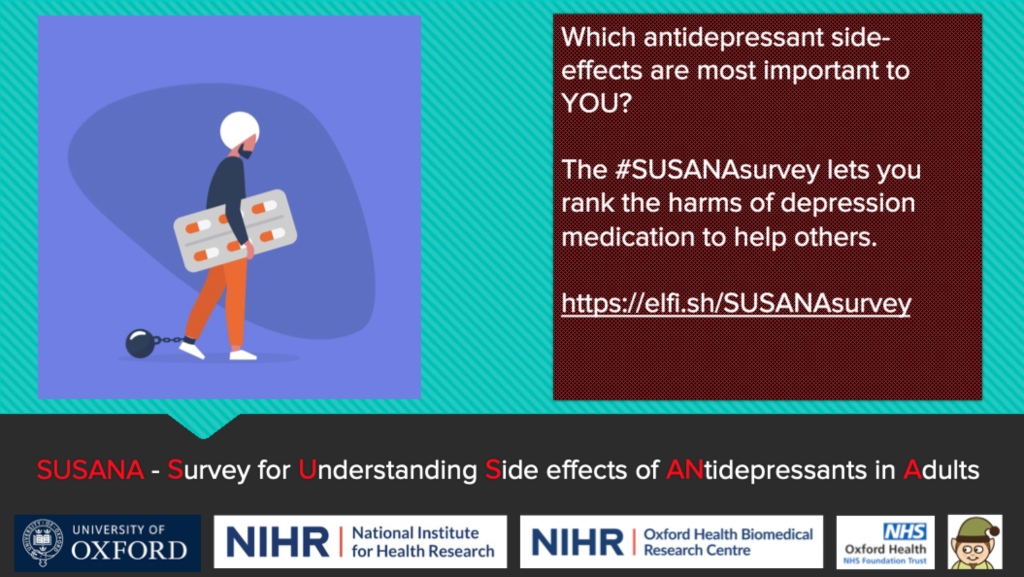
Antidepressants are indicated for the treatment of many disorders in psychiatry, including mood disorders, anxiety disorders, post-traumatic stress disorder, obsessive-compulsive disorder and eating disorders. Growing evidence suggests an increased use of antidepressants worldwide, however their safety profile is one of hottest controversies in the scientific literature at present.
Randomised controlled trials (RCTs) remain the gold standard to assess efficacy and acceptability of treatment interventions, but observational studies can complement RCTs by providing longer term data on a number of adverse health outcomes, which is not possible in RCTs (this is especially true for rare events).
As several meta-analyses of observational studies about antidepressant safety have been published so far, we welcome the umbrella review “Association of Antidepressant Use With Adverse Health Outcomes: A Systematic Umbrella Review” by Dragioti and colleagues (2019) who managed to summarise the evidence from multiple existing meta-analyses and quantify the credibility of their findings (this is a very important issue here, because of the intrinsic uncertainty surrounding observational research results).

This new umbrella review (Dragioti et al, 2019) brings together the results from 45 meta-analyses of observational studies, which look at the potential harms caused by antidepressants.
Methods
In this umbrella review, the authors tried to answer whether the use of antidepressants is associated with adverse events and how credible is the evidence behind this association.
The protocol for this study is registered on PROSPERO (CRD42018103462).
The authors analysed data only from published meta-analyses of observational studies with a cohort or case-control study design, that assessed the association between antidepressant use or exposure and adverse health outcomes. They graded the evidence as convincing, highly suggestive, suggestive, weak, or not significant, according to sample size, strength of the association, and assessment of presence of biases. They searched PubMed, Scopus, and PsycINFO from database inception to April 5, 2019, with no age, sex, population, and medical condition restrictions.
According to high level methodology in evidence synthesis, two independent reviewers recorded the data and assessed the quality of the included meta-analyses. using the AMSTAR 2 (A Measurement Tool to Assess Systematic Reviews).
For each association, the authors extracted the effect sizes of individual studies included in each meta-analysis, and repeated the meta-analyses to calculate the pooled effect sizes and the 95% Confidence Intervals using random-effects models. Heterogeneity was assessed with the I2 statistic. Small-study effect bias was investigated and excess significance bias was set at P ≤ .10 (this test is designed to assess whether the published meta-analyses comprised an overrepresentation of false-positive findings). Assessment of the credibility of the evidence and sensitivity analyses were also performed.
Results
In total, the authors scrutinised 252 full-text articles (from the initial number of 4,471 studies identified by the electronic search), and in the end included 45 meta-analyses (17.9%), corresponding to 695 studies that described 120 associations, including data from 1012 individual effect size estimates.
- Seventy-four (61.7%) of the 120 associations were nominally statistically significant using random-effects models.
- Fifty-two associations (43.4%) had large heterogeneity (I2 > 50%), whereas small-study effects were found for 17 associations (14.2%) and excess significance bias was found for 9 associations (7.5%).
- Convincing evidence emerged from both main and sensitivity analyses for the association between antidepressant use and:
- Risk of suicide attempt or completion among children and adolescents
- Autism spectrum disorders with antidepressant exposure before and during pregnancy
- Preterm birth
- Low Apgar scores.
- None of these associations remained supported by convincing evidence after sensitivity analysis, which adjusted for confounding by indication.
It is worth mentioning that the published paper reports more results and a lot of additional information is available in the online supplement.

This review identified associations between antidepressants and suicide in young people, autism, preterm birth and low Apgar scores, but these associations all disappeared after the reviewers accounted for confounders.
Conclusions
Findings from this study suggest that the most putative adverse health outcomes associated with antidepressant use may not be supported by convincing evidence (Hagberg 2018), and the confounding by indication may alter the few associations with convincing evidence.
The authors concluded that:
antidepressant use appears to be safe for the treatment of psychiatric disorders, but more studies matching for underlying disease are needed to clarify the degree of confounding by indication and other biases.
They also added that:
no absolute contraindication to antidepressants emerged from this umbrella review.

This new umbrella review of observational studies suggests that antidepressants are safe for most people who experience mental health difficulties.
Strengths and limitations
This review was carried out by an international team of well-known researchers. Evidence syntheses such as systematic reviews and meta-analyses provide a rigorous and transparent knowledge base for translating clinical research into decisions, and thus they represent the basic unit of knowledge in medicine. Umbrella reviews are reviews of previously published systematic reviews or meta-analyses. Therefore, they represent one of the highest levels of evidence synthesis currently available, and are becoming increasingly influential in biomedical literature. However, practical guidance on how to conduct umbrella reviews is required in order to critically appraise them.
10 key points to consider for umbrella reviews (Fusar Poli, 2018)
- Ensure that the umbrella review is really needed
- Pre-specify the protocol
- Clearly define the variables of interest
- Estimate a common effect size
- Report the heterogeneity and potential biases
- Perform a stratification of the evidence
- Conduct sensitivity analyses
- Report transparent results
- Use appropriate software
- Acknowledge the limitations.
This new paper by Dragioti et al., meets these criteria, however a real understanding of how to conduct umbrella reviews is relatively limited. Researchers, clinicians and policy makers should use these key points to inform the planning, conducting and reporting of umbrella reviews in psychiatry specifically, and in medicine more generally.

To properly answer the question whether antidepressants are safe, an important component to be considered is the personal burden of specific adverse effects. To get this information, we need to involve people who have lived experience of antidepressants and collect their feedback.
Going beyond observational data
The present umbrella review focuses on cohort and case control studies. Considering the broad scope of this review (use of antidepressants across a wide range of clinical diagnoses) it is understandable that the authors decided to limit the type of studies under investigation. However, we think that the best information about side effects should also include data from RCTs. Both randomised and observational data are important if we want to identify the specific predictors of effect at the level of individual patients: randomised studies should be used to evaluate the effect modifiers and observational data to identify the prognostic factors.
The PETRUSHKA project (Personalise antidEpressant TReatment for Unipolar depreSsion combining individual cHoices, risKs and big datA) aims to perform an analysis of individual participant data obtained from multiple antidepressant clinical trials as well as real-world datasets about depression and antidepressants. This innovative approach has the potential to provide more accurate estimates of comparative effectiveness, acceptability and tolerability of interventions, but also to provide “individualised” predictions of the probability of response to a specific treatment and of experiencing a particular side effect (Tomlinson et al., in press). The integration of both sources of information is essential to move from generic and theoretical effects to a truly personalised precision psychiatry approach.
To do so, cohort and case control studies are probably not the best source of information for real world data. We need big datasets, which collect routine data and can be linked to each other. In the UK, existing databases, such as CPRD and QResearch for primary care and UK-CRIS for secondary care, if supported by advanced statistical and machine learning techniques, will allow almost real time and long-term analyses of clinically relevant outcomes, both in terms of efficacy and tolerability.
Asking people with lived experience
To really answer the question whether antidepressants are safe, another important component to be considered is the burden of adverse effects. This can vary from one person to another, but it is important to involve people who have lived experience of antidepressants and collect their feedback. This is what we are doing with the SUSANA survey (Survey for Understanding the Side effects of ANtidepressants in Adults) an international survey about the side effects of antidepressants in depression.
This survey has been conducted in English, German and French and so far, has collected feedback from more than 2,000 patients, carers and clinicians across the world (Tomlinson et al., 2019). The survey is open until October 15th 2019: everybody with personal experience of taking or prescribing antidepressants is invited to complete the survey now and provide their own views on the matter: SUSANA will enable the identification and ranking of the most common adverse effects of antidepressants, based on how troublesome and impairing they can be for patients in the real-world (Kernot et al., 2019).

Take the SUSANA Survey before 15th October 2019 to make sure that your experiences of taking or prescribing antidepressants are captured.
Implications for practice
One of the main implications for practice from this umbrella review (Dragioti et al, 2019) is what the authors write in their summary box:
This study’s findings suggest that claimed adverse health outcomes associated with antidepressants may not be supported by strong evidence and may be exaggerated by confounding by indication; no absolute contraindication to the use of antidepressants was found to be currently supported by convincing evidence.
This is only the starting point and it is not the final answer to the clinical problem as a whole about the tolerability of antidepressants. We need to personalise antidepressant treatment and use the best available evidence (observational, randomised and real-world data) to inform the decision-making process between clinicians, patients and carers; incorporating their preferences and values about specific adverse events.
To do so, we need individual patient data from existing studies and databases, under the “umbrella” of a material collaboration between industry and academia! Our colleagues in other medical disciplines already do this. The clock is already ticking and it is time to move on. And we need to move fast. Otherwise we will miss the unique opportunity to improve the outcomes for all of our patients in the national health system, which is our ultimate and most important goal as clinicians and researchers.

The clock is ticking. We need to act fast to bring together individual patient data from existing studies and databases, under the “umbrella” of a material collaboration between industry and academia. – Ciprani and Tomlinson, 2019
Conflicts of interest
Andrea Cipriani and Anneka Tomlinson are involved in PETRUSHKA, a project about personalised treatment of antidepressants in depression, funded by the UK National Institute for Health Research.
Links
Primary paper
Dragioti E, Solmi M, Favaro A, et al. (2019) Association of Antidepressant Use With Adverse Health Outcomes: A Systematic Umbrella Review. JAMA Psychiatry. Published online October 02, 2019. doi:10.1001/jamapsychiatry.2019.2859
Other references
Fusar-Poli P, Radua J. Ten simple rules for conducting umbrella reviews. Evid Based Ment Health. 2018;21(3):95-100.
Hagberg KW, Robijn AL, Jick S. Maternal depression and antidepressant use during pregnancy and the risk of autism spectrum disorder in offspring. Clin Epidemiol. 2018 Nov 1;10:1599-1612.
Kernot C, Tomlinson A, Chevance A, Cipriani A. One step closer to presonalised prescribing of antidepressants: using real-world data. Evid Based Ment Health. 2019 Aug;22(3):91-92
Tomlinson A, Furukawa T, Efthimiou O et al. Personalise antidEpressant TReatment for Unipolar depreSsion combining individual cHoices, risKs and big datA (PETRUSHKA): Rationale and Protocol. Evid Based Mental Health. In Press
Tomlinson A, Efthimiou O, Boaden K, et al. Side effect profile and comparative tolerability of 21 antidepressants in the acute treatment of major depression: protocol for a network meta-analysis. Evid Based Mental Health. 2019;22(2) 61-66
Photo credits
- Photo by Ulises Baga on Unsplash
- Photo by Craig Whitehead on Unsplash

Very interesting paper, particularly the suggestion that associations between SSRIs and eg ASD are due to confounding by indication. Could have done with some explanation of the stats involved though – took a bit of reading up to follow along.
Really interesting article. As we know, anxiety and depression are one of the main co-existing conditions that are associated with ASD. As ASD is suggested to be hereditary, many individuals in adulthood go undiagnosed or misdiagnosed, therefore this could part explain some of the results.